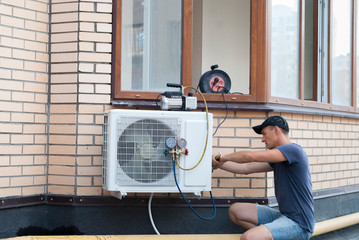When should you repair your air conditioner? If your air conditioner isn’t producing cold air, it may be due to a few reasons. These problems include low Freon levels, a broken compressor, or poor airflow. Most repairs involve replacing one part or the other, so you may be able to avoid an expensive new unit. But if the problem is severe, it may be time for a replacement. When these things happen, it’s best to contact a professional.

Another sign that your air conditioner needs repair is if it’s emitting an unusual smell. If it’s blowing warm air, it’s most likely that the air filter is blocked. If you notice that the air is smelly, it could be due to the compressor or the belt. This will require a professional. You can also check the thermostat. If you detect a malfunctioning thermostat, you may need to repair AC.
Depending on the severity of the problem, it can cost thousands of dollars to repair an air conditioner. Luckily, most HCAV professionals use the “5,000 rule” as a guideline: multiply the age of the unit by 5% to determine whether it’s time to replace it. Moreover, if your AC unit has undergone multiple maintenances, it’s likely that it’s time for a replacement. If it’s less than five years old, however, you may want to consider having a professional come to inspect it. If your AC is a home warranty beneficiary, you may be able to file a claim if your AC is experiencing any of these problems.
If your air conditioner is causing excessive leakage, you may want to consider a replacement. In extreme cases, the refrigerant in the system could be leaking and pose a health hazard. Water leakage, on the other hand, could damage your floors, and furniture, and may even cause mold growth. If this happens, you should contact a professional as soon as possible. It’s essential to get your air conditioning fixed before the damage gets worse.
You can usually repair your air conditioning system yourself. If you’ve recently bought a new system, you might want to consider getting it repaired if it’s not in good condition. A new system may only cost a fraction of the cost of a replacement. However, if you’ve owned your system for at least 10 years, it’s probably time to replace it. There are other reasons to replace your AC unit.
If your energy bill spikes suddenly, it’s time to repair your air conditioning system. This may be due to a broken thermostat switch, leaky ductwork, or age. Your utility bills can also increase without you changing your usage. A new system will likely cost half as much as your current one. If you’re unsure whether your air conditioning system is old enough, you can also try a new unit. However, if the AC system you have now is not working properly, it’s better to replace it.
An older air conditioner tends to run less efficiently than a new one. This is reflected in its Seasonal Energy Efficiency Ratio (SEER), which is lower than the efficiency of newer air conditioning units. In 2006, the standard efficiency rating for air conditioning was 10 SEER; today, it is 13.
In some cases, air conditioning systems are simply too old and in need of replacement. You might be using an outdated model, or it might be mismatched with your home’s existing comfort needs. If your system isn’t capable of doing its job, you may want to consider upgrading your system to one that offers newer home comfort technologies, such as variable speed technology or zoning. This is especially true if the noises are louder than normal.
Another common problem is that the thermostat in your air conditioning unit is incorrectly placed. The thermostat controls the temperature of the air entering the evaporator coil. If it’s not placed properly, your AC may run continuously, even if you’ve turned it off. A professional technician will be able to properly adjust the thermostat to correct the problem. It’s best to call a technician for an inspection if you suspect this is the culprit.
